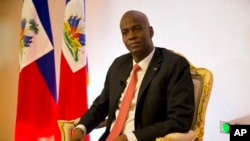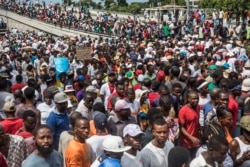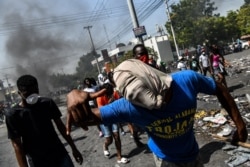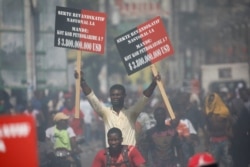Haitians fed up with poverty call him corrupt and incompetent and want him to resign, but President Jovenel Moise is evasive about yielding and offers only vague ideas for making things better.
The poorest country in the Americas has been roiled for two months by protests that were triggered by fuel shortages and have now turned violent.
And they have morphed into a broader campaign against the president, who come to power in 2017 in an election that some called fraudulent.
Asked if he would consider ending his term early, Moise said Tuesday in exclusive interview with AFP that he is not "attached to power" but rather "attached to reforms because this country has been suffering for decades."
He said his priorities were constitutional reform, changes to the energy sector, instituting use of computers throughout all government agencies and customs reform.
The protests are spreading: in recent weeks, various professional or social groups have taken to the streets against the president one after another, such as university students and artists. On Tuesday, it was Catholics, singing prayers and some holding rosaries, who took to the streets to denounce the president.
There is no dialogue under way with the opposition, and the already weak economy is starting to suffer. Companies hungry for business are laying people off, such as hotels in Port-au-Prince.
"It's true. There is a problem," said Moise. "People are fed up, exasperated."
"But we must find a way to profit from this crisis, to turn it into an opportunity," said Moise.
He said this process "requires much self-transcendence, wisdom and serenity."
'Looking for work'
Things are so tense in Haiti with violence breaking out at protest rallies that schools have been closed for more than a month.
Moise called on "my brothers and sisters in the opposition" to work with the government to get the schools back open.
He offered no concrete proposal for emergency measures to take on crime gangs that block roads to rob people or prey on them in cities.
"People who seek ransom out on the roads, who set up barricades, they are looking for work," said Moise.
He said the police are spread very thin: there are only 20,000 of them in a country of 12 million people.
Even before this crisis erupted, Moise was accused of corruption.
An auditors court probing $2 billion in aid from a Venezuelan oil fund found that companies run by Moise before he became president were "at the heart of an embezzling scheme."
The money was part of a program called Petrocaribe, in which Venezuela under Hugo Chavez provided Latin American countries with oil at cut rate prices.
In Haiti, it did so from 2008 to 2018 and the aid was seen as a source of waste and corruption for the four successive Haitian governments that administered it.
After the auditors court came out with its report in June, Moise asked for help from the Organization of American States to audit Petrocaribe. Critics saw this as a way to dodge and defy the Haitian justice system.
"Some think it amounts to interference in affairs of state but we are founding members of the OAS," Moise said.
"It is not a matter of trust. To the contrary, the idea is to instill trust in everyone and say to everyone that there has to be a fair process," said Moise.







